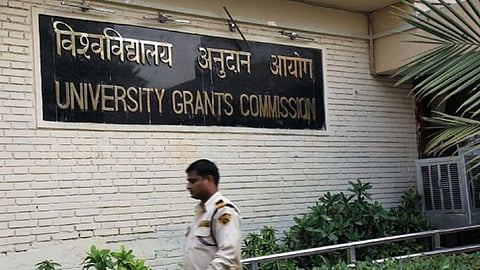
New Delhi- A recent notice issued by the UGC has sparked controversy within the academic community. Beginning in the academic year 2024-25, PhD admissions will utilize National Eligibility Test (NET) scores, eliminating the necessity for separate entrance examinations conducted by universities and higher education institutions.
The University Grants Commission (UGC) made this announcement, emphasizing the streamlining of the admission process and the reduction of students' burden.
Presently, NET scores are utilized for granting Junior Research Fellowship (JRF) and determining eligibility for assistant professor appointments.
According to UGC officials, an expert committee was formed to review the examination's provisions, leading to the decision to extend the use of NET scores to PhD admissions. This change is anticipated to simplify the admission process for students, as they will only need to take one entrance test for multiple purposes rather than multiple tests for each university.
The decision, made during the 578th meeting of the UGC on March 13, is aligned with the implementation of the National Education Policy (NEP-2020) and is set to take effect from the academic year 2024-25.
However, not everyone is onboard with the idea. Many members of the education fraternity have raised concerns regarding the step undertaken by UGC.
Pratyay Malakar, an educator and an upcoming PhD scholar from Jamia Millia Islamia, expressed concerns about the impact on marginalized communities.
“Institution-level entrances used to make PhD admissions more accessible, which will now be missing,” said Pratyay. She added, “There are operational difficulties attached with NET. It requires a lot of documentation which might not be with the marginalized communities.”
A scholar from Jawaharlal Nehru University, who wishes to remain anonymous, expressed apprehensions about the loss of university autonomy.
He elaborated that NET exams occur twice annually, posing logistical challenges if relied upon solely for interviews. Entrance exams previously served as a filtering mechanism.
“It is unrealistic to rely on interviews alone to ensure fair student selection, as there have been numerous instances where students from marginalized backgrounds have faced disproportionate discrimination during these interviews,” added the scholar from JNU.
He further mentioned that NET exams frequently lack methodological or research-oriented questions, and instead focus on facts or timings rather than analytical thinking.
Prabodhan Pal, Assistant Professor at Manipal Centre of Humanities, also raised concerns regarding the process.
He stressed, “As per the global academic standard is concerned, PhD admissions involve Statement of Proposals as well, which engage students with their research fields before the start of the term.”
“But the recent policy decision taken by the UGC disregards universal practices as a parameter for admission.”
According to Professor Pal, this will limit the chances of students interested in academia.
Even the student body ‘All-India Democratic Students Organisation’ (AIDSO) has voiced opposition to the decision, contending that mandating NET scores for PhD admissions will disproportionately disadvantage many, particularly those from underprivileged backgrounds.
In a statement issued by the collective, the AIDSO emphasized that requiring NET could effectively exclude numerous aspirants who lack access to costly coaching industry, which has become a crucial prerequisite for NET success. The organization urged the Union government to promptly reverse this decision.
According to a report in The Hindu, a Vice-Chancellor from a state university criticized the UGC's decision, arguing that it undermines universities' autonomy in facilitating research.
The Vice-Chancellor emphasized that the UGC should not exert authority over universities solely based on providing grants. They suggested that matters such as examinations, admissions, fees, and other course-related affairs, including PhD programs, should be under the jurisdiction of individual universities.
Another Vice-Chancellor expressed concerns about the Union government's purported efforts to dismantle autonomous institutions by imposing a centralized admissions system. They cautioned that if NET scores became the sole criterion for PhD admissions, universities would relinquish their autonomy over research activities.
UGC NET, or University Grants Commission National Eligibility Test, is an examination aimed at determining the eligibility of Indian nationals for roles such as 'Assistant Professor' and 'Junior Research Fellowship and Assistant Professor' in Indian universities and colleges.
Conducted by the National Testing Agency (NTA) in Computer Based Test (CBT) mode since December 2018, UGC NET categorizes scores into three groups. Candidates qualifying with JRF are eligible for the Junior Research Fellowship, Assistant Professorship, and PhD enrollment, while those qualifying for NET are eligible for Assistant Professorship and PhD admission.
Candidates are permitted to join universities as PhD scholars based on their marks obtained. There is no upper age limit for the UGC NET professorship exam, but candidates applying for JRF must be 30 years old or younger.
The exam consists of two papers, Paper 1 and Paper 2, both containing multiple-choice questions (MCQs), and is conducted biannually in June and December.
You can also join our WhatsApp group to get premium and selected news of The Mooknayak on WhatsApp. Click here to join the WhatsApp group.